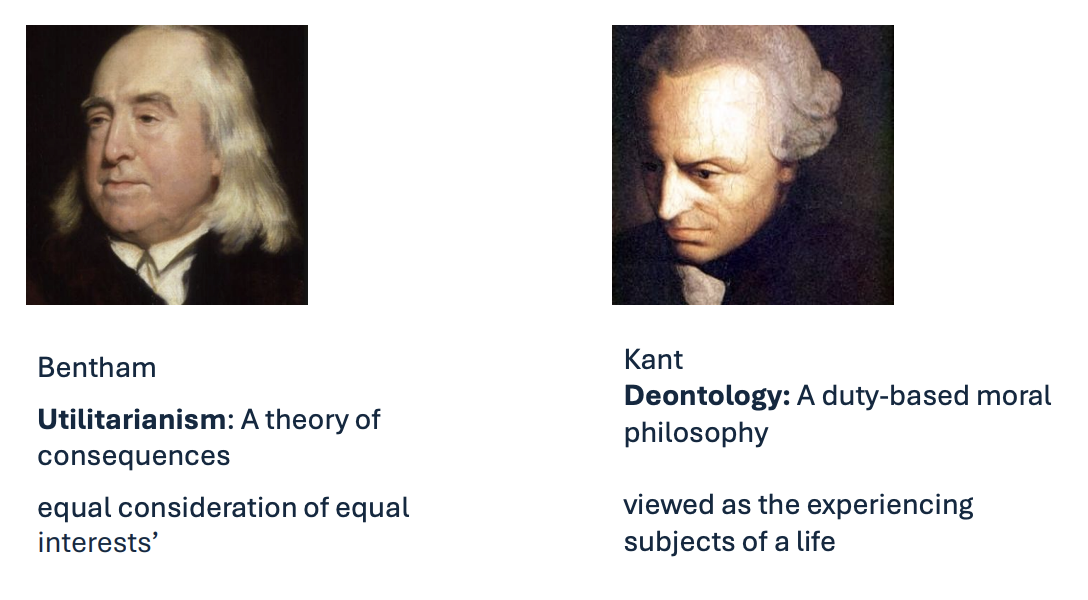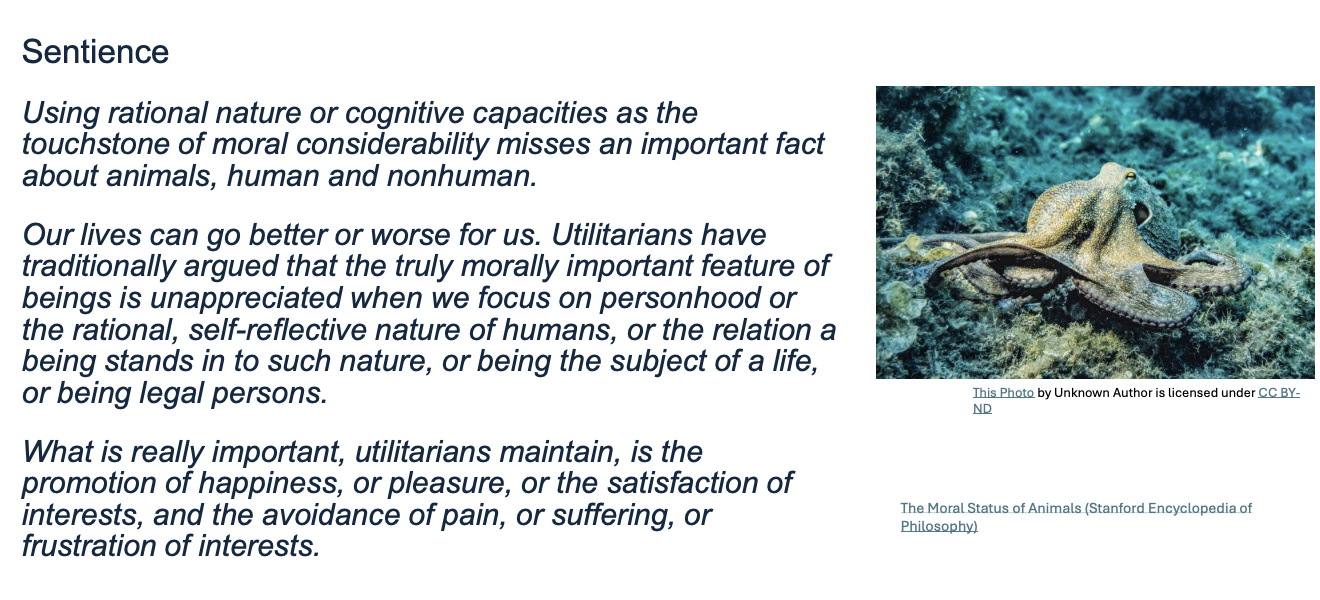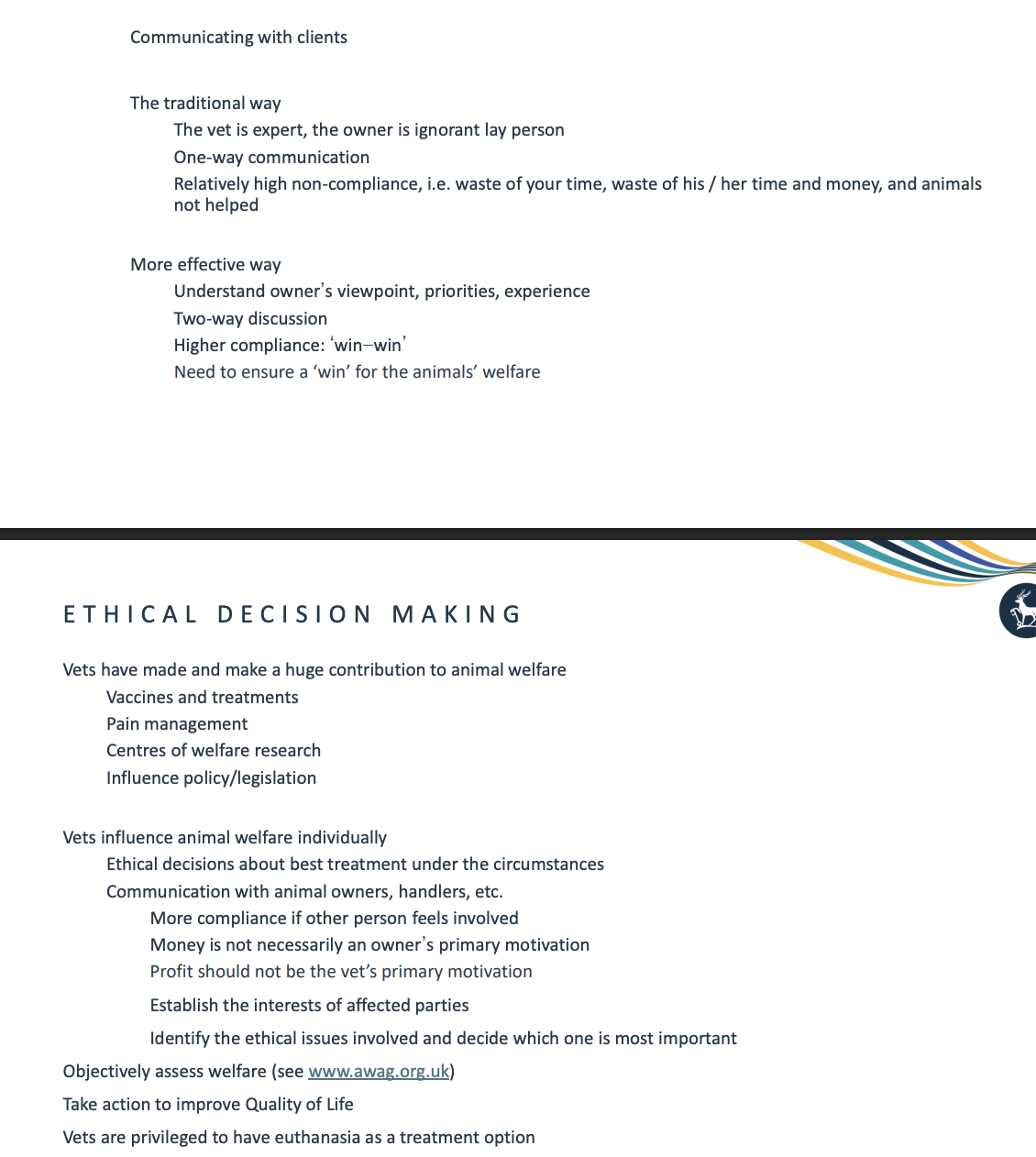animals and ethics
1/16
There's no tags or description
Looks like no tags are added yet.
Name | Mastery | Learn | Test | Matching | Spaced |
|---|
No study sessions yet.
17 Terms
what is ethics influenced by
• ‘Social ethics’ – rules that have emerged to enable us to live together
• Professional ethics - RCVS
• Personal ethics – derived from experience
• Ethical theory
it is a branch of philosophy
• Not just private judgements
• Moral values and prevalent ethical theories hold societies together
• Wide agreement between different ethical theories and between different
cultures
• Ethical theories have systematic logical reasoning
Ethical theory → moral justification
• Reasons leading to a conclusion or viewpoint
• Requires consistency in thinking/reasoning
cest quoi le status moral?
• Moral status is a concept that deals with who or what is so valuable that it should be treated with special regard.
• Moral Status is the degree to which an organism deserves ethical consideration, often placed on a hierarchy.
• Not the same as Moral Agency….
• A moral agent is a person who has the ability to discern right from wrong and to be held accountable for his or her own actions. Moral agents have a moral responsibility not to cause unjustified harm.
• Traditionally, moral agency is assigned only to those who can be held responsible for their actions. Children, and adults with
certain mental disabilities, may have little or no capacity to be moral agents.
what is speciesism
The view that only humans should be morally considered is sometimes referred to as “speciesism”.
Peter Singer popularised the term and focused on the way speciesism, without moral justification, favors the interests of humans:
Discrimination based on race, like discrimination based on species is thought to be prejudicial, because these are not factors that matter when it comes to making moral claims
Human Exceptionalism
- Distinct human capacities – on this basis humans has moral status
and animals do not
- A number of capacities have been proposed—developing family
ties, solving social problems, expressing emotions, starting wars,
having sex for pleasure, using language, or thinking abstractly
- However – none of these are unique to humans – Science has
proved this!
5 points of moral theory
1. Utilitarian
2. Animal rights
3. Contractarian
4. Respect for nature
5. Relational
utilitarianism vs deontology

Those that want to change practices with respect to animals fall into two different
camps
1. Seek animal rights – advocates oppose any and all human ‘use’ of animals.
Invoke Kantian idea that human beings should be treated as an ends, not a
means – but they extend the idea to animals. ‘the ability to be experiencing
subjects of a life’. Deontological approach. PETA and Humane Society.
2. Protection of animal welfare – advocate for stronger laws preventing cruelty
and requiring humane treatment. Adopt a non-speciesism Utilitarian approach.
RSPCA and BVA.
M O R A L T H E O R Y – R I G H T S ( D E O N T O L O G Y )
• Each animal matters for its own sake, regardless of its effect
on others
• Animals’ lives matter to them – they seek to survive, make
choices
• Animals have potential to fulfil
• Animals experience mental states and can suffer
• Therefore, we owe them treatment that respects these
attributes – we have duties to them and should not inflict
suffering in order to benefit ourselves
• Animals have rights – just like humans

M O R A L T H E O R Y - W E L F A R E ( U T I L I T A R I A N I S M )
•Distinguishes between a right and wrong action by its
consequences in relation to happiness or pain.
•The ‘rightness’ of an action is determined by its contribution to
the happiness of everyone (everything) affected by it. “The
greatest good for the greatest number”
•In any situation one should choose the possibility which most
augments the general welfare
•BUT
•How do we make the calculation?
•How do you compare human happiness and animal happiness
in the same equation?
M O R A L T H E O R Y – C O N T R A C T A R I A N I S M
•Anthropocentric (regarding humans as the central or most important element of existence)
•We can use animals as we need to for our benefit
•We do not have duties to animals because they cannot enter into contracts (question over domestication of animals – did they enter a contract?)
•BUT we must treat them well because harming them would be an indirect harm to other humans with whom we can have contracts
•Animal cannot make enter into contracts, they matter to other humans, which means we have an indirect obligation to them.
M O R A L T H E O R Y – R E S P E C T F O R N A T U R E
•Consequences for species not individuals
•Species have value
•Individuals only matter as representatives of the group so selective culling
of healthy animals is permissible to preserve the wellbeing of the group
•Farming practices may disrupt the ecosystem - use of drugs excreted into
the environment, affect the local microbial populations, reliance on
concentrate feed with ingredients sourced from around the world, affects
the ecosystem.
This belief promotes that we should respect not only animals, but all species. • When a species becomes extinct, it is not the resources lost that is the issue, it is the species itself.
• Under this view, selective breeding may be challenged and viewed as unacceptable
M O R A L T H E O R Y – R E L A T I O N A L
• Mutually beneficial relationship: animals depend on
us for food etc., in return we use their products.
• Their dependence on us as caregivers obliges us to
treat our animals well.
• Owner/animal bond: We have a particular duty of care
towards them. More duties for domesticated animals?
• Extent varies according to
owner/species/pet/production -problem of sliding
scale of moral concern
ethical theories are logical but conflicting - how so
• Animals cannot enter into reciprocal arrangements with us: contractarian
• Animals are sentient and their suffering or pleasure is of concern: utilitarianism
• A species as a whole is different from an individual – may need to sacrifice the
individual to preserve the species: respect for nature
• Animals’ lives do matter to them: animal rights
• We do have bonds with our own animals and a particular duty of care towards
them: relational views
Ethical theories are logical but conflicting – Farming

Ethical theories are logical but conflicting – Research
Contractarian: set animal welfare standards to allay
public concern and maximise benefits to people
Utilitarian: animal welfare of major concern
3Rs: Replace, Reduce, Refine
Use can only be justified if the benefit to people
outweighs the harm done to the animals
Rights: does experimentation respect the animal’s rights
and preserve their dignity?
Right not be killed and not to be used as a means to
an end → no animal testing even if any harm is minor
or Right to be protected from certain uses e.g.
extreme pain, but other uses permissible
E T H I C A L D E C I S I O N M A K I N G

summary of animal welfare
• Animal welfare is about how sentient animals experience their lives and to
understand it requires animal welfare science
• Animal welfare is affected by how people think we should treat animals, what they think is important - but need education……and facts
• Ethics weighs the scientific knowledge with human desires (e.g. to earn a living by farming; to clear land and build houses), so we decide how we should treat animals.
• Animal welfare involves the law which should reflect the decisions that society has reached – using science and ethical reasoning – about how we ought to treat animals.
• BUT often animal welfare law may set a low standard of care (no public money to enforce higher standards or the public is not aware of welfare problems or is not willing to spend money on enforcing higher standards of welfare)
The vet is obliged to ensure the welfare of animals committed to
his/her care